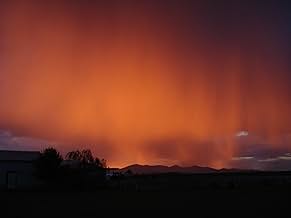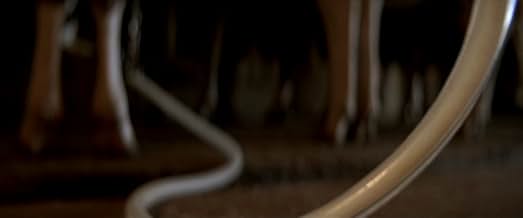VALUTAZIONE IMDb
7,2/10
7050
LA TUA VALUTAZIONE
In una comunità dei Mennoniti in Messico, la fede di un padre viene messa alla prova quando si innamora di una nuova donna.In una comunità dei Mennoniti in Messico, la fede di un padre viene messa alla prova quando si innamora di una nuova donna.In una comunità dei Mennoniti in Messico, la fede di un padre viene messa alla prova quando si innamora di una nuova donna.
- Premi
- 30 vittorie e 12 candidature totali
Recensioni in evidenza
The movie is about a father of a big family living on a remote farm, in old fashioned way. He falls in love for another woman and is caught in between love and respect. I think it was both very interesting and unusual in the same time. I didn't know anything about it when I watched it, except that it's 140 minutes long :) Yeah, the movie grows very slowly and you have to be very patient while watching it. Some parts contain very little communication, and other are very Lynch-like. Some stuff that you would consider unimportant are carried out into details in the movie. The music and the scenery shots were beautiful, and the acting was good. It was an unique experience and I hope you'll know what I think about after you see it.
With Stellet Licht, Mexican director Carlos Reygadas follows a different path from his previous films. Reygadas tells a very simple and age-old story: the choice of a man between two women. However, it's his unique vision of life what makes this film stand out from the hundreds of films made with this subject matter.
A contained and wonderful Cornelio Wall delivers a range of feelings, resting almost entirely in his expressive eyes. His excellent performance fits perfectly with the quiet and slow pace of the film. The rest of the cast is also great, with really natural performances throughout the film.
The cinematography and editing are also gorgeous, developing an unique pace and look to the film that would have bored in any other film. While the pace of the film is extremely slow, the audience gets used to it, preventing boredom from affecting the viewers, as it normally occurs with other slowly-paced films.
The film happens in the secluded Menonite settlement of the beautiful state of Chihuahua, introducing us to a world completely different from ours, but the universal feeling of the story makes us realize that, regardless of the differences between different groups of people, we are all similar.
A contained and wonderful Cornelio Wall delivers a range of feelings, resting almost entirely in his expressive eyes. His excellent performance fits perfectly with the quiet and slow pace of the film. The rest of the cast is also great, with really natural performances throughout the film.
The cinematography and editing are also gorgeous, developing an unique pace and look to the film that would have bored in any other film. While the pace of the film is extremely slow, the audience gets used to it, preventing boredom from affecting the viewers, as it normally occurs with other slowly-paced films.
The film happens in the secluded Menonite settlement of the beautiful state of Chihuahua, introducing us to a world completely different from ours, but the universal feeling of the story makes us realize that, regardless of the differences between different groups of people, we are all similar.
It is a very good film. This is contemplation cinema, with beautiful landscapes and really touching scenes. Although the argument isn't an innovative one, the context and the way the director captures its work empowers the story and succeeds in maintaining viewers attention despite the long shots that often makes the spectator to run out of patience, to get distracted or bored. Innovative context. The first movie about Mexican mennonites (40 000)in their own language (plautietsch)played by real mennonites that aren't real actors. It shows in an honest way their life style in the northern Mexican state of Chihuahua, how they live almost without interacting with Spanish speaking mexicans. Up to now, definitely Carlos Reygadas best film. I'm not saying that everybody would enjoy this film, but to me it is an excellent movie and I broadly recommend it. Its awards are richly deserved. "Stellet Licht" is a work of art.
This is certainly not a film for everybody and I will be careful in who I recommend this movie to. It is challenging because it is very unsatisfying to the 5 senses we are used to (over)feed. This movie is like meditating, you need to surrender to it, ignore what your mind is telling you about what a movie should be, surrender to the slowness first and then to the lack of almost everything we are normally used to in a movie. There is so little you can chew on, no acting, inhibited emotions, no laughter, even the acclaimed picture is unsatisfying (don't see this movie for that reason). Everything is internal, barely reaching the surface. If you can tune in though, like in a meditation, you will become ultra sensitive, sense the subtle and begin to enjoy. Some scenes may even totally fill your spirit. One word of caution though, if you intend to see this movie in a theatre: it is very likely that some people will become uncomfortable and leave, keep talking, protest etc... which makes it even more difficult to watch it with serenity so renting it as a DVD may be a more suitable option. If you are the kind of person enjoying a walk in the countryside contemplating nature without talking you'll probably enjoy this movie. If you prefer talking or being entertained then chances are that you will not.
Silent Light (2007)
I don't think you should pre-judge this film by director Carlos Reygadas's known style--lots of long, matter of fact takes, and mostly amateur actors. This is a Mexican film, and some Spanish language appears, but most of it is in a Mennonite dialect, a kind of country German carried over by Russian immigrants. Seeing these simple people from the inside is a large part of the interest here, even though it's not a documentary. Reygadas makes it a point to get the pace of their lives, which is apparently very slow!
It's odd to see such deliberate photography in the mold of Ozu, with the still camera and the offscreen activity now and then, and to realize how difficult it is to pull that off. Only because it doesn't quite work here. It becomes an affectation, even so that the curvature of the widescreen (and anamorphic, I think) photography becomes a distraction. The approach, however, makes for a very quiet movie, viscerally, and because of that it penetrates the characters and gets to some moving issues.
It's a deeply felt story, for sure, and that was enough to make me want to watch it. But there were times when I felt like I was sitting it out through conviction. It almost forced you to feel sad, and to share the loneliness of these country folk who struggle on their farms not to survive, but to understand love and meaning. Heavy stuff, and laid out with amazing seriousness. And also shown in clear, appreciative views.
You will get the feeling sometimes that there ought to be someone out in this forlorn landscape who is happy, and who has some sense of quick wit. But apparently not! It's a despondent experience, and that actually is what I liked about it. But I'm not sure it is enough, this drawn out sadness alone, with lots of ambient droning sounds (very vivid) overwhelms the apparent "plot" of a love that isn't appropriate.
Is it good? I think some people will totally love it. I'd recommend it for those who want to really lose themselves in another world, in realistic and un adorned terms, a world that is unspectacular on the surface, and very probing and beautiful within.
I don't think you should pre-judge this film by director Carlos Reygadas's known style--lots of long, matter of fact takes, and mostly amateur actors. This is a Mexican film, and some Spanish language appears, but most of it is in a Mennonite dialect, a kind of country German carried over by Russian immigrants. Seeing these simple people from the inside is a large part of the interest here, even though it's not a documentary. Reygadas makes it a point to get the pace of their lives, which is apparently very slow!
It's odd to see such deliberate photography in the mold of Ozu, with the still camera and the offscreen activity now and then, and to realize how difficult it is to pull that off. Only because it doesn't quite work here. It becomes an affectation, even so that the curvature of the widescreen (and anamorphic, I think) photography becomes a distraction. The approach, however, makes for a very quiet movie, viscerally, and because of that it penetrates the characters and gets to some moving issues.
It's a deeply felt story, for sure, and that was enough to make me want to watch it. But there were times when I felt like I was sitting it out through conviction. It almost forced you to feel sad, and to share the loneliness of these country folk who struggle on their farms not to survive, but to understand love and meaning. Heavy stuff, and laid out with amazing seriousness. And also shown in clear, appreciative views.
You will get the feeling sometimes that there ought to be someone out in this forlorn landscape who is happy, and who has some sense of quick wit. But apparently not! It's a despondent experience, and that actually is what I liked about it. But I'm not sure it is enough, this drawn out sadness alone, with lots of ambient droning sounds (very vivid) overwhelms the apparent "plot" of a love that isn't appropriate.
Is it good? I think some people will totally love it. I'd recommend it for those who want to really lose themselves in another world, in realistic and un adorned terms, a world that is unspectacular on the surface, and very probing and beautiful within.
Lo sapevi?
- QuizMexico's official submission for the 80th Academy Awards, and the first film from that country that is not in Spanish. Under AMPAS's new rules for Best Foreign-Language Film, it is eligible for a nomination.
- BlooperThe English subtitles translate one line as "The man on the phone wants a plutonium exhaust." This would be expensive, not to mention environmentally hazardous! Presumably the line actually refers to platinum, not plutonium.
- Colonne sonoreLes Bonbons
Written and performed by Jacques Brel
I più visti
Accedi per valutare e creare un elenco di titoli salvati per ottenere consigli personalizzati
- How long is Silent Light?Powered by Alexa
Dettagli
- Data di uscita
- Paesi di origine
- Sito ufficiale
- Lingue
- Celebre anche come
- Silent Light
- Luoghi delle riprese
- Aziende produttrici
- Vedi altri crediti dell’azienda su IMDbPro
Botteghino
- Budget
- 980.000 € (previsto)
- Lordo Stati Uniti e Canada
- 60.200 USD
- Fine settimana di apertura Stati Uniti e Canada
- 11.967 USD
- 11 gen 2009
- Lordo in tutto il mondo
- 877.577 USD
- Tempo di esecuzione
- 2h 25min(145 min)
- Colore
- Mix di suoni
- Proporzioni
- 2.35 : 1
Contribuisci a questa pagina
Suggerisci una modifica o aggiungi i contenuti mancanti









